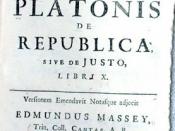The Republic Plato
The Republic is known as Plato's greatest piece of work. It consists of a group of different arguments on a great variety of subjects. They are different issues and items that occur when organizing a government. Plato's recommendations for the "Fair and Just" city are diverse and in some cases strange. Many of his ideas are extremely abstract, but make for an interesting story.
The question at the center of the Republic is whether it is better to live justly or unjustly. In the story, Plato constructs a perfectly just and fair city. The city is in-depth and complex. This city is made up of guardians, auxiliaries, and the tradesman. As most cities, the lower of the three groups, or classes, is the majority of the population. The guardians lead the city, and are all fully educated philosophers. They symbolize wisdom and knowledge in the city.
The auxiliaries are less educated than the guardians, but still quite educated. These people fight and stand for courage. The rest of the population receives a general education. The balance of the city is guaranteed by a cruel and complex system that guarantees that the best people will be selected for each of the positions. Everyone is meant for one, and they are always put in it. The city is in order because the guardians, the wisest, rule over the auxiliaries and the base population at large. The city is just because everyone is doing the job that best fits them, the guardians lead the government and such, the auxiliaries fight the battles, and the rest of the commoner work at their jobs. Just as many modern day civilizations are.
According to Plato, different powers of the mind correspond to different grades of being. Knowledge grasps unchanging being.


